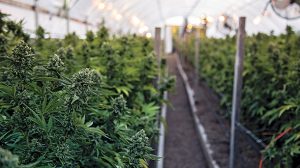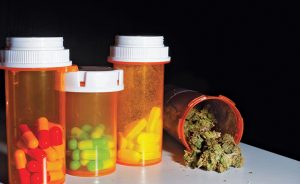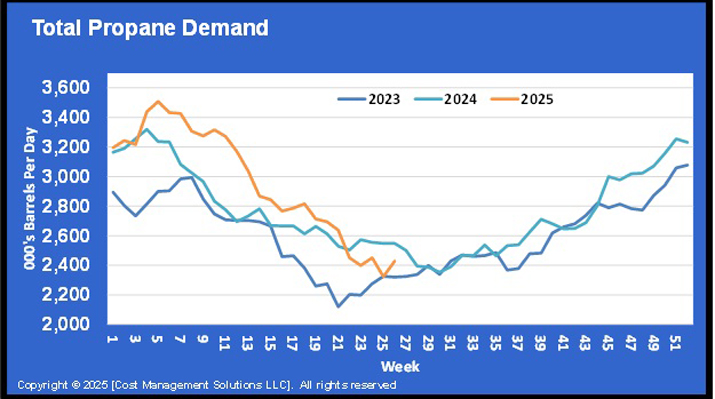High on safety: How marijuana legalization is affecting propane retailers

Retailers embrace the extra gallons sold to marijuana growers, who tend to operate in rural, greenhouse settings. Photo: iStock.com/RylandZweifel/RobinOlimb
Over half of the states in the U.S. have passed laws legalizing the medical or recreational use of marijuana, and more legislation appears to be on the horizon.
This growing trend presents unique hiring, safety and legal challenges while also bringing business growth opportunities to both large and small propane operations.
As an industry, propane toes the line in the sand drawn by marijuana legalization. Retailers embrace the extra gallons sold to marijuana growers, who tend to operate in rural, greenhouse settings and can benefit from the portable fuel as much as their agricultural colleagues. At the same time, retailers must examine the legal, human resources and safety issues the legalized use of marijuana may bring to propane operations in their respective states.
Talking safety
“In any market that uses propane, we want folks to be safe,” says Stuart Flatow, vice president of safety and training at the Propane Education & Research Council. “That requires a certain amount of training and education. Propane professionals need to know what their safety plans are.”
Understanding the laws and safety regulations affecting propane operations is important for marketers, especially as marijuana becomes mainstream in the United States. In this transition, retailers need to closely examine safety policies and work with their safety-sensitive employees.
The Omnibus Transportation Employee Testing Act of 1991 recognizes the safety need to ensure a drug- and alcohol-free environment for transportation employees. These employees, defined by the U.S. Department of Transportation (DOT) as safety sensitive, include commercial driver’s license (CDL) operators. To put it simply, the CDL operator is subject to DOT workplace drug and alcohol testing. Marijuana metabolites/tetrahydrocannabinol (THC) is on the list of drugs detected in these tests.
Safety-sensitive employees cannot use or possess alcohol or any illicit drug, including marijuana, while assigned to perform or actually performing safety-sensitive functions, the DOT explains. A propane bobtail or delivery driver falls under this category.
To address recent legalization of medical and recreational marijuana in some states, the DOT released two notices to explain its regulations regarding safety-sensitive transportation employees.
According to the DOT “recreational marijuana” notice, state initiatives (on marijuana legalization) will have no bearing on the regulated drug testing program. The DOT’s Drug and Alcohol Testing Regulation – 49 CFR Part 40 – does not authorize the use of Schedule I drugs, including marijuana, for any reason. Additionally, the testing regulation does not authorize medical marijuana under a state law to be a valid medical explanation for a transportation employee’s positive drug test result.

DARK GREEN: Medical marijuana broadly legalized
LIGHT GREEN: Marijuana legalized for recreational use
WHITE: No broad laws legalizing marijuana
The DOT notes marijuana remains a drug listed in the Schedule I of the Controlled Substances Act. It remains unacceptable for any safety-sensitive employee, subject to drug testing under the DOT’s drug testing regulations, to use marijuana.
“We definitely do not want anyone conducting any type of propane operations, delivering or installing, under the influence of marijuana, alcohol or any other substance,” Flatow says. “Whether someone has a medical card or not, public safety should take precedence.”
In an LP Gas magazine survey, only 32 percent of participants said marijuana was currently an issue at their companies. Despite that number being relatively low, some survey participants seemed concerned about what the legalization of marijuana could mean for their operations.
Overall, the main concern regarding marijuana usage in a propane operation is the risk of an employee coming to work impaired and creating an accident that harms the business, customers or employees. This concern extends from the safety-sensitive employees, like bobtail drivers, to office staff, including customer service representatives (CSR).
“Certainly, you would hate to have a CSR that is under the influence of anything,” Flatow says. “If a customer calls and says they smell gas, you would want that CSR to be sober and clear thinking and not under the influence of anything. CSRs are as important as anyone else in that stream of commerce and in safety, and for them to be clear headed and sober is pretty important, too.”
Cathy Wallace of San Isabel Services Propane in Colorado gives a similar sentiment on CSR sobriety.
“Let’s say somebody calls and they say, ‘I smell propane in my house,’” Wallace explains. “We need to be competent and tell that customer they need to leave the home immediately and all the other steps we ask them to take. If you are stoned, you might miss something.”
Retailers can agree that sober employees are more productive and competent, but how can retailers ensure that all employees are sober? The DOT-regulated drug testing provides an easy answer for safety-sensitive employees, but how do you manage the risk of marijuana usage in employees who are critical to safety but are not subject to regulations mandated by the federal government?
Zero tolerance
Retailers, especially those operating in states where marijuana is legal for medical or recreational use, could be inclined to think a zero-tolerance drug policy is too good to be true. But retailers can indeed conduct a business with a zero-tolerance drug policy.
An article from the Western Propane Gas Association’s Gaslight magazine, titled “Marijuana for everyone? Society’s changing attitude reflected in workplace practices,” authored by Katherine P. Sandberg and Danielle S. Urban of Fisher Phillips LLP, explains that in 2015 the Colorado Supreme Court held that employees do not have protection from disciplinary action, including loss of employment, if they violate their employers’ workplace drug policies through the use of medical marijuana.
Simply put, this ruling provides employers can still maintain a zero-tolerance drug policy.
Over 80 percent of the survey participants believe a zero-tolerance drug policy is important to running a successful operation. Wallace agrees this is the way to run her propane operation.
“My opinion would be to run our companies as a drug-free organization,” Wallace says. “We do not believe we get the maximum capacity out of someone who might be stoned.”
Wallace explains she examines her company’s drug policy on an annual and semi-annual basis. Using company safety meetings, Wallace explains that staff members cannot have THC in their blood. She suggests retailers make a marijuana amendment to their drug policies if they haven’t done so already.
“Absolutely [retailers should update their drug policy],” Wallace says. “Update that policy and get it in the hands of your people. Make sure you have a signed copy in their employee file, so if something happens then you’ve got backup.”
An article in HR Magazine says at a minimum, drug and alcohol policies should prohibit the use, possession, sale, distribution or manufacture of drugs and drug paraphernalia at work; forbid employees from reporting to work while under the influence; reserve the right to conduct searches of workspaces upon reasonable suspicion; and ensure compliance with applicable federal and state laws.
It is also important for a retailer and company staff to be on the same page, through communication.
“Make sure you are revisiting that drug policy, especially in an area where marijuana just became legal,” Wallace says. “I would revisit that every three months and pass that policy around and have each employee sign it because that is front-of-mind awareness.”
Contrary to Wallace’s advice, over 90 percent of survey participants who operate in a state with marijuana legalization say they have not amended or created a marijuana drug policy.
But even with a zero-tolerance policy, retailers are still exposed to the safety dangers of marijuana usage because of testing inconsistencies.
Sandberg explains a propane retailer’s ability to drug test is determined by the state’s regulations or laws in their respective labor code regarding drug testing in general. When it comes to safety-sensitive employees, employers can conduct random drug testing because of the DOT regulations. Other employees can also be tested under reasonable suspicion.
Since non-safety-sensitive employees – like a CSR – are separate from DOT regulations, retailers are faced with the challenge of finding employees under the influence. Reasonable-suspicion-certified employees serve as one possible solution to this issue.
These employees go through a training session to learn the symptoms people may exhibit if they are under the influence of drugs or alcohol. If an employee comes to work exhibiting symptoms of being under the influence of marijuana, for example, the reasonable-suspicion-certified employees can intervene and prevent a potentially unsafe situation. According to Sandberg, drug testing can be done under reasonable suspicion.
A growing challenge with the fewest solutions is the legal usage of marijuana by an off-duty employee.
Sandberg and Urban provide an example of off-duty employees using marijuana on a Saturday but coming to work on Monday with THC still in their system. Because THC can be found in their blood, a drug test would come back positive despite the employees not being under the influence. This is because marijuana is metabolized in the body differently than alcohol.
This becomes a human resource challenge for retailers. Wallace advises against retailers having strict policies for every scenario. It is important to have policies that provide strict guidelines but do not constrict the way you run your business. In the above example, a retailer would want enough leeway to make the best decision for employees that is not necessarily laid out in a policy.
The human element
Propane retailers also face hiring concerns when it comes to marijuana legalization.

If an employee is sick and needs marijuana as a medication, employers in certain states are required by law to make a reasonable accommodation for employees. Photo: iStock.com/gabe9000c
“Propane marketers have had difficulty getting qualified employees who can pass a drug test for quite some time. The problem has grown exponentially since marijuana has been legalized for both recreational and medicinal use in Colorado,” says Dan Binning, executive director of the Colorado and New Mexico propane gas associations. “I have heard from many retailers that the issue is serious and getting more so.”
In the already-tight labor market, many companies are facing instances of turning away potential employees because of their legal marijuana usage. Human resource managers need to balance their commitment to maintaining a safe workplace with the need to hire good employees.
Retailers are also having to balance the changing laws and federal regulations surrounding marijuana when it comes to their hiring pool.
“The myriad of regulations and discrepancy between state and federal laws on marijuana use will continue to create confusion with drivers and employers,” says Carlton Revere of Virginia-based Revere Gas.
“I would have said that federal regulators had the authority to solve the issue, but that is obviously not the case,” he adds. “As our society alters its attitude on marijuana use, so must the regulations if we want our driver pool to not get any smaller.”
Outside of hiring, retailers still need to manage their employees’ health needs.
If an employee is sick and needs marijuana as a medication, employers in certain states are required by law to make a reasonable accommodation for employees. In other states, Wallace notes, employers can make certain exceptions.
“If someone has a medical marijuana card and they are sick and they have been with the company for a long time, perhaps there might be an opportunity to move them into a role that has no customer contact,” Wallace says.
Wallace makes the comparison to an employee who is sick and takes medicine outside of marijuana. Because that person is sick and needs the medication, does a retailer have to fire the employee? Or can the company find a new place for the employee to work that is safe and productive?
One retailer in the LP Gas survey says he temporarily laid off an employee until that employee could pass a drug test. The company then tested that employee every month for a year. This idea of being a “recovery-friendly workplace” is also suggested in the HR Magazine piece.
The article recommends creating policy that fosters workplace education and outreach; coordination with an employee assistance and wellness program; supervisor training; HR support; and confidential access to peer-recovery support.
















